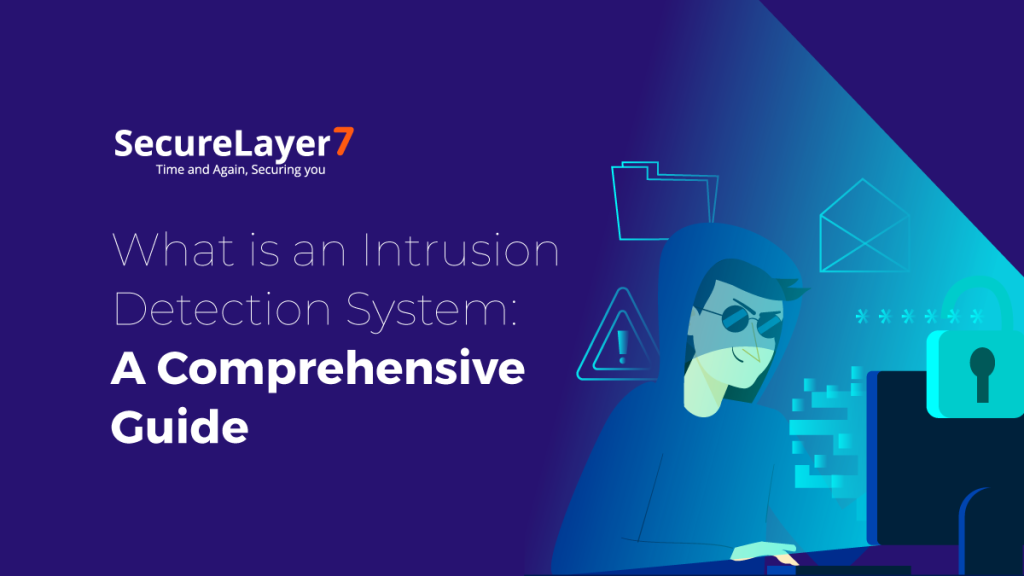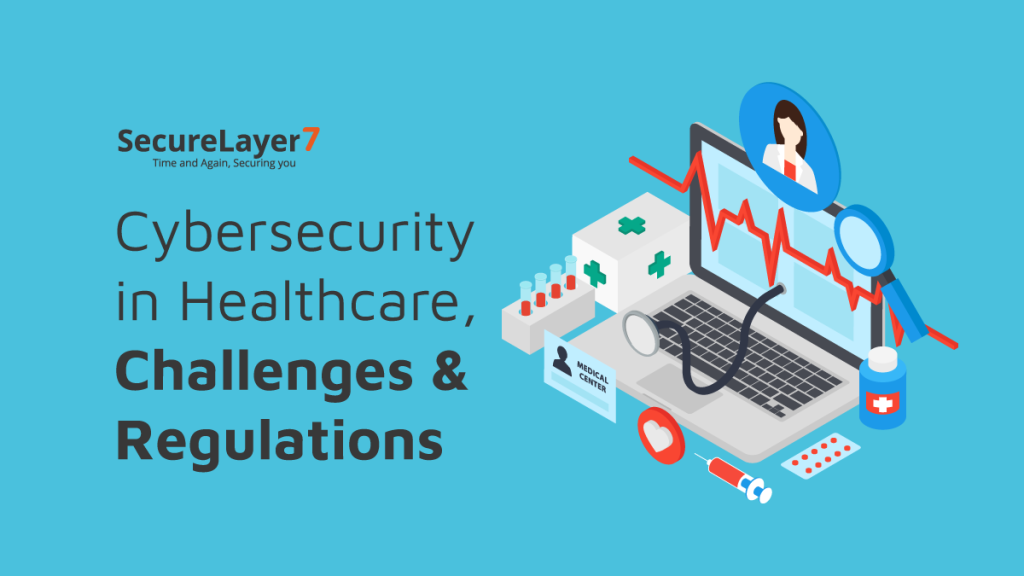
Understanding IoT Penetration Testing In 2023
June 6, 2023
Cybersecurity Tips That Every Startup Founder Needs To Know
June 14, 2023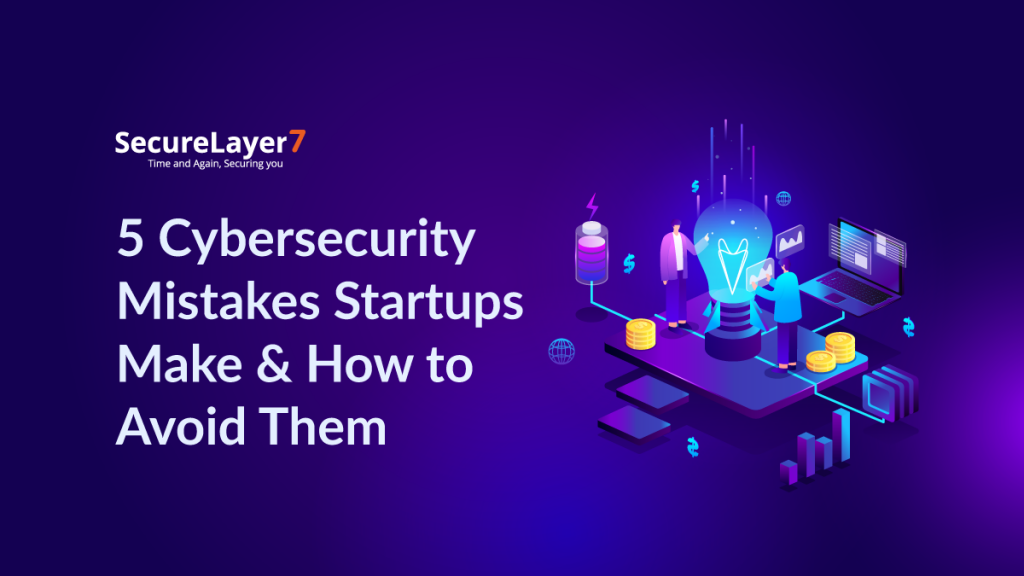
Starting a business is like embarking on a thrilling adventure. It’s a journey filled with excitement, challenges, and endless possibilities.
Just like raising a child, a startup requires nurturing, dedication, and careful attention to every aspect of its growth. As a startup owner, you invest your heart and soul into building a strong and successful organization that can thrive in the competitive landscape.
However, amidst the hustle and bustle of launching a startup, one crucial aspect often gets overlooked: cybersecurity.
It’s a topic that is frequently underrated and misunderstood, yet it holds immense importance in today’s digital age. Neglecting the cybersecurity of your startup can have dire consequences, including devastating data breaches and a tarnished reputation.
In this insightful blog post, we will shine a spotlight on the top five cybersecurity mistakes that startups commonly make.
We will delve into the potential risks associated with these mistakes and, most importantly, provide you with valuable tips on how to avoid them.
By taking proactive steps to safeguard your startup’s sensitive information and digital assets, you can ensure the longevity and success of your organization in the years to come.
To know about the benefits of penetration testing for early stage startups, you can check out our blog here.
Top 5 cybersecurity mistakes startups need to avoid
Here are the top five mistakes that should be avoided to take your startup to an upgraded level. These will help you stand out from the crowd and establish a strong reputation in the industry.
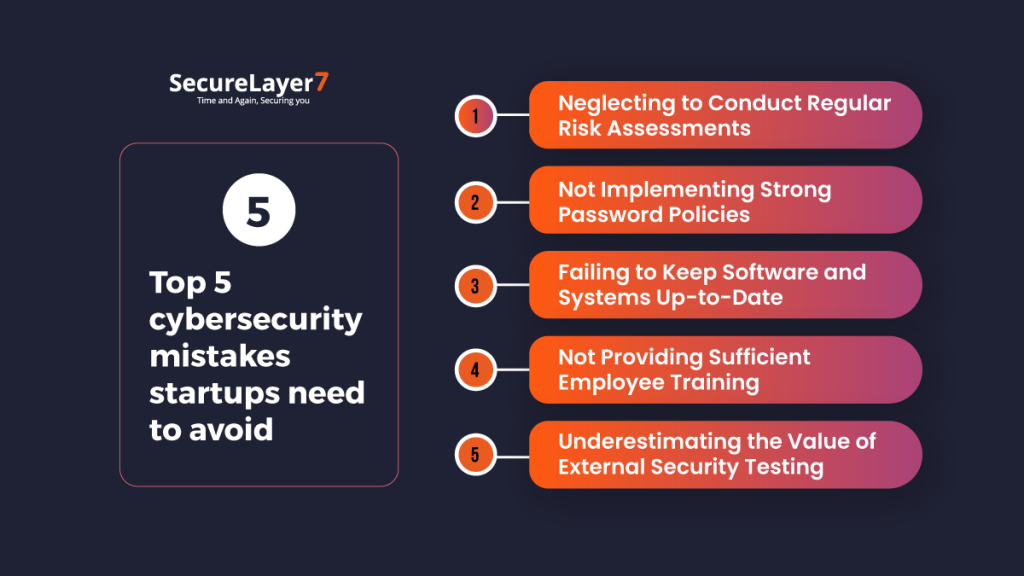
Let us take a closer look at each one of them to have a better understanding.
1. Neglecting to Conduct Regular Risk Assessments
One of the biggest mistakes startups make regarding security is neglecting to conduct regular risk assessments.
A risk assessment helps to identify potential threats and vulnerabilities in your organization’s systems, processes, and people, which allows you to prioritize and allocate resources to mitigate those risks.
By neglecting to conduct regular risk assessments, startups run the risk of leaving their systems and data vulnerable to attack.
Regularly testing software and systems for vulnerabilities can also help to identify potential security risks and vulnerabilities. The process includes conducting regular penetration testing and vulnerability scans to identify weaknesses in the organization’s systems and processes.
2. Not Implementing Strong Password Policies
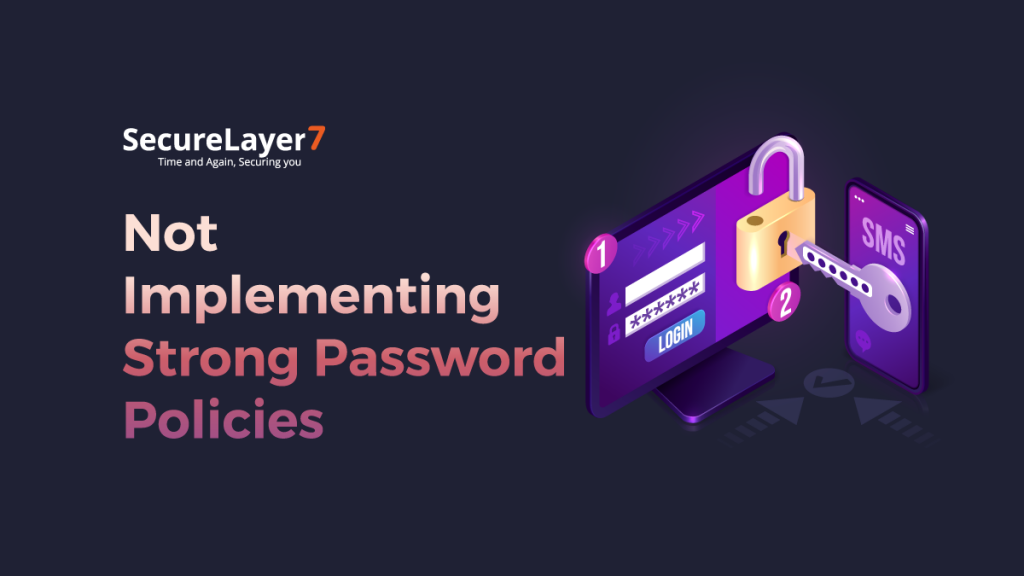
Weak passwords can be easily guessed or hacked, which can lead to unauthorized access to sensitive data and systems.
To avoid this mistake, startups should implement strong password policies that require users to create complex passwords that are difficult to guess.
To enhance password security, it is recommended to implement measures such as enforcing a minimum password length, mandating the inclusion of special characters and numbers, and disallowing the usage of commonly employed passwords.
Additionally, startups should consider implementing multi-factor authentication, which requires users to provide additional information beyond a password to access sensitive data and systems.
Examples of multi-factor authentication include using a biometric factor such as a fingerprint or face recognition, or a one-time code sent to a user’s mobile device.
Regularly reminding employees of the importance of strong passwords as well as providing training on how to create and manage them can also help to reduce the risk of password-related security incidents.
3. Failing to Keep Software and Systems Up-to-Date
This is another common and crucial mistake that startups make. Software and systems that are not regularly updated can contain vulnerabilities that can be exploited by attackers.
To avoid this, startups should establish a regular schedule for updating software and systems. This can include installing patches and updates as soon as they become available and performing regular system updates.
Startups should also consider using automatic software update features whenever possible. This can help ensure that software and systems are always up-to-date with the latest security patches and features.
In addition to software and system updates, startups should also ensure that security software such as firewalls, antivirus, and intrusion detection systems are regularly updated and maintained to provide effective protection against potential threats.
4. Not Providing Sufficient Employee Training
Employees can unintentionally introduce security risks through their actions, such as falling victim to phishing attacks, using weak passwords, or accidentally downloading malware.
It is crucial that startups provide regular security training to employees to help them recognize and avoid common security threats. This can include training on how to identify phishing attacks, how to create strong passwords, and how to securely handle sensitive data.
Employees should also be trained on how to use security software and tools effectively, such as firewalls and antivirus software, to help protect the organization’s systems and data.
Training should be an ongoing process, with regular updates and reminders provided to employees to help keep security top of mind. Startups should also consider conducting regular security awareness campaigns to help promote a culture of security within the organization.
Startups should consider implementing security policies and procedures to help guide employee behavior and ensure that security best practices are followed. This can include policies around data handling, password management, and incident response.
Regularly reviewing and updating these policies can help ensure that they remain effective and relevant over time.
5. Underestimating the Value of External Security Testing
External security testing, such as penetration testing and vulnerability assessments, can help identify security weaknesses and vulnerabilities that may not have been identified through internal testing.
To avoid this mistake, startups should engage with external security experts to perform regular security testing on their systems and applications. This can help you identify and address vulnerabilities before they can be exploited by attackers.
Regularly testing and auditing the organization’s systems and processes can help to ensure that security measures are effective and that potential risks and vulnerabilities are identified and addressed promptly.
Additionally, startups should consider establishing a bug bounty program, which offers incentives to external security researchers to identify and report vulnerabilities in the organization’s systems and applications.
This can help to identify potential risks and vulnerabilities that may not have been discovered through other means.
Considering external security testing as an essential component of their security strategy and should prioritize engagement with external security experts is one of the best ways to identify potential security risks and vulnerabilities.
Read Also – The Complete Cybersecurity Checklist For Startups And Small Businesses
Secure Your Startup Today With SecureLayer7
At SL7, we understand the importance of security for startups. Our team of experienced security professionals can help your startup identify and address potential security risks and vulnerabilities, ensuring that your organization’s systems and data are protected against potential threats.
Our services include:
- Security Assessments – We conduct comprehensive security assessments of your organization’s systems and applications, identifying potential vulnerabilities and weaknesses that could be exploited by attackers.
- Security Testing – We perform penetration testing and vulnerability assessments to identify potential risks and vulnerabilities in your organization’s systems and applications.
- Security Policy Development – We can help your startup develop effective security policies and procedures, including incident response plans and data handling policies.
- Employee Training – We provide security training and awareness programs to help educate your employees on how to recognize and avoid common security threats.
- Ongoing Support – We provide ongoing support and guidance to ensure that your organization’s security measures remain effective over time.
Don’t wait until it’s too late to secure your startup. Contact SL7 today to learn more about how we can help protect your organization’s systems and data against potential threats.
